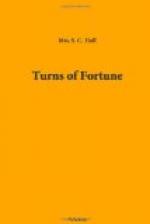People who only talk about doing “something,” generally end by doing “nothing.” Another year passed; Mrs. Adams was still an invalid, the younger girls more delicate than ever, the boys waiting, as before, their promised appointments, and more extravagant than ever; and Miss Adams had made a conquest which even her father thought worthy of her.
The gentleman who had become really attached to this beautiful girl was of a high family, who were sufficiently charmed with the object of his affections to give their full sanction, as far as person and position were concerned; but the prudent father of the would-be bridegroom thought it right to take an early opportunity of waiting upon the doctor, stating his son’s prospects, and frankly asking what sum Dr. Adams proposed settling on his daughter. Great, indeed, was his astonishment at the reply—“He should not be able to give his daughter anything immediately, but at his death.” The doctor, for the first time for many years, felt the bitterness of his false position. He hesitated, degraded by the knowledge that he must sink in the opinion of the man of the world by whom he was addressed; he was irritated at his want of available funds being known; and though well aware that the affections of his darling child were bound up in the son of the very gentlemanly but most prudent person who sat before him, he was so high and so irritable in his bearing, that the fathers parted, not in anger, but in any thing but good feeling.
Sir Augustus Barry was not slow to set before his son the disadvantages of a union where the extravagant habits of Miss Adams had no more stable support than her father’s life; he argued that a want of forethought in the parents would be likely to produce a want of forethought in the children; and knowing well what could be done with such means as Dr. Adams had had at his command for years, he was not inclined to put a kind construction upon so total a want of the very quality which he considered the best a man could possess; after some delay, and much consideration of the matter, he told his son that he really could not consent to his marriage with a penniless bride. And Dr. Adams, finding that the old gentleman, with a total want of that delicacy which moneyed men do not frequently possess, had spoken of what he termed too truly and too strongly his “heartless” want of forethought, and characterised as a selfishness the indulgence of a love for display and extravagance, when children were to be placed in the world and portioned—insulted the son for the fault of the father, and forbade his daughter to receive him.




